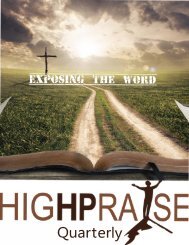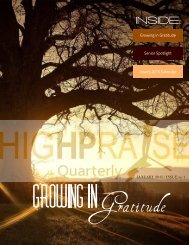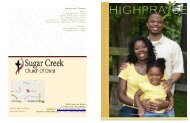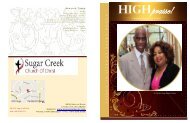You also want an ePaper? Increase the reach of your titles
YUMPU automatically turns print PDFs into web optimized ePapers that Google loves.
1870 First Vatican Council<br />
Objectives<br />
Discover how this council changed the fabric of the catholic church.<br />
Examine the areas of the council stayed away from the word of God.<br />
The Purpose of the Council<br />
The First Vatican Council was convened in 1869 by Pope Pius IX and ended in 1870. It was<br />
planned in utmost secrecy for about four years. Pius IX had commissioned the cardinals<br />
resident in Rome to give him their opinions as to the effectiveness of a council, the majority<br />
was in favor of it.<br />
The purpose of this Council was to deal with the contemporary problems of the rising<br />
influence of liberalism, materialism and inspiration of Scripture. In addition to these<br />
purposes the council was also convened to define the Catholic doctrine, and explore the<br />
dogma of papal infallibility.<br />
Even though in 1854 this doctrine of papal infallibility had been used to define the<br />
Immaculate Conception of Mary as doctrine. In 1951, they declared that she had ascended<br />
unto heaven, where she was crowned as the "Queen of heaven." This was called the<br />
Assumption of Mary. The proposal to define papal infallibility was met with resistance. The<br />
reason for this was not because of a lack of belief in this idea, but because some considered<br />
it inconvenient to take that step at that time.<br />
For all practical purposes, the working sessions of the Council ended on July 18, 1870, the<br />
day on which Pope Pius IX solemnly proclaimed the doctrine of papal infallibility. In the seven<br />
months between December and July, some 700 Catholic priests met in 86 general<br />
congregations and four public sessions to discuss the topic.<br />
The Super Pope<br />
The doctrinal constitution states that the Pope has “full and supreme power of jurisdiction<br />
over the whole <strong>Church</strong>,” and that when he “speaks ex cathedra. Ex cathedra is a Latin<br />
phrase which means "from the chair" that is, when, in the exercise of his office as shepherd<br />
and teacher of all Christians, in virtue of his supreme apostolic authority, he defines a<br />
doctrine concerning faith or morals to be held by the whole <strong>Church</strong>, he possesses, by the<br />
divine assistance promised to him in blessed Peter, that infallibility which the divine<br />
Redeemer willed his <strong>Church</strong> enjoy in defining doctrine concerning faith or morals” (Chapters<br />
3:9 and 4:9).<br />
According to the Roman Catholic <strong>Church</strong>, this infallibility of the pope, only when speaking ex<br />
cathedra, is part of the Roman Catholic <strong>Church</strong>’s Magisterium, or the “teaching authority of<br />
the <strong>Church</strong>” which God gave to the “mother <strong>Church</strong>” to guide her infallibly. This “teaching<br />
authority of the <strong>Church</strong>” is made up of the pope’s infallible teaching ability, the infallible<br />
teaching ability of church councils assembled under the authority of the pope, and the<br />
“ordinary” Magisterium of the bishops.

















